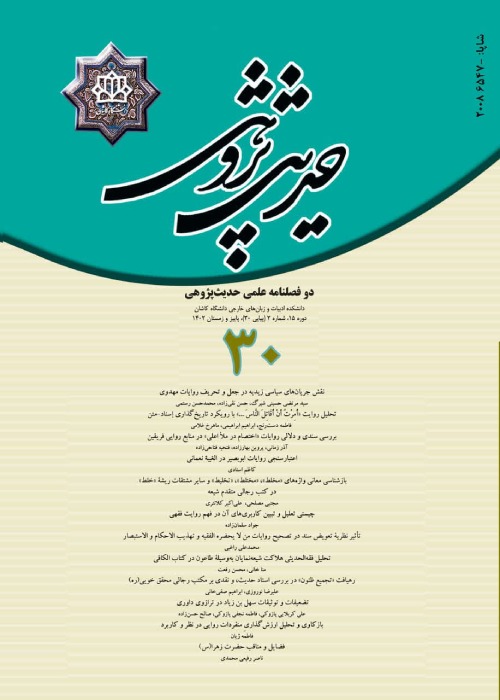Sahl ibn Ziyad’s Weaknesses and Validations in the Scale of Arbitration
Sahl ibn Ziyad Adami, nicknamed Razi, is one of the transmitters of many Shia hadiths. This transmitter has understood the presence of Imam Javad, Imam Hadi, and Imam Hasan Asgari (pbuh). Many traditions have been narrated from this transmitter; for example, Kuleini narrated more than 150 cases directly from Sahl ibn Ziyad in his Kafi book. However, there is a difference of opinion regarding their reliability and lack of reliability. The importance of this study shows that despite the fact that Sahl ibn Ziyad is one of the transmitters of many hadiths and many hadiths have been narrated from him in Kāfī book, most of the jurists have weakened Sahl ibn Ziyad and do not trust his hadiths before Muhaqiq Behbahani.However, Muhaqiq Bihbahani in his "ta'liqat on Manhaj al-Maqal", p. 176 and the book of Masabih al-Zilam, vol. 2, p. 496, seeks to prove the reliability of Sahl ibn Ziyad. After Muhaqiq Behbahani, many researchers have believed in his reliability or at least the validity of his traditions. The question is, what is the basis of weakening Sahl ibn Ziyad? Are these weaknesses true about him? Are the validations made about Sahl ibn Ziyad defensible? The importance of this study is that proving the reliability of Sahl ibn Ziyad or lack of it will have an important impact on the field of Shia religious and jurisprudential education.
In order to achieve this goal, a Isnad and a descriptive and analytical method, and in some cases, a comparative method have been used. Following the views of Rijal books such as Rijāl Ghada'iri, Rijāl Shaykh Tusi, Rijāl Najashi, Rijāl Kashshī, and… we carefully examined the different views about Sahl ibn Ziyad and by comparing them, we explained the basis of the viewpoint of validating and weakening of Sahl ibn Ziyad and the reason for his weaknesses.
By following the words of thinkers and the books of Rijali, we concluded that if we understand the reasons for the weakening of Sahl ibn Ziyad in the words of some great ones such as Kashshī, Ibn Walid, Shaykh Tusi, Ghada'iri, and Najashi, then we can explain their words. For example, Najashi in this sentence: "Kan Zaifa fi Hadith…" (He was very weak in hadith) did not consider Sahl ibn Ziyad to be weak, but attributed the weakness to his hadiths, which shows that he does not accept his method of narrating hadiths, and the phrase «غیر معتمد فیه» (He is unreliable) also indicates the unreliability of Sahl ibn Ziyad in hadiths. Many researchers have come to the phrase «ضعیف فی الحدیث» (weak in hadith) to refer to weakness and trust in messengers. For example, Sahib Jawahar says that Najashi said about Sahl that he is weak in hadith, and Ibn Ghada'iri also said that he narrates weak hadith and relies on the traditions of the messengers. These words do not contradict the validation of Sheikh Tusi and Allameh, because these taunts are about his traditions and not Sahl ibn Ziyad himself. It seems that if the bases of validating and weakening are explained correctly, proving the reliability of Sahl is not a difficult task. The main reason for not attesting to Sahl is his weakening by Ahmad ibn Muhammad ibn Isa Ash'ari, which is a reflection of Qomiein's strict view on "extremism" (Ghuluww); but this view has no scientific basis and is not accepted and confirmed by all the scholars of jurists. Therefore, the weakening that is based on it is also not accepted. In addition, there is much evidence on the reliability of Sahl, the most important of which are: the abundance of traditions about Sahl in important books such as Kafi, the abundance of quotes from great figures, the validation of Sahl ibn Ziyad and his reliability by the contemporary scholars such as Imam Khumeini (ra), Ayatullah Araki, Ayatullah Shubairi Zanjani, and Ayatullah Sobhani. Therefore, despite the accusations and weaknesses that have been made about Sahl, considering the much evidence on his reliability Sahl ibn Ziyad can be considered reliable and his traditions can be trusted, and because of the existence of Sahl ibn Ziyad in the document of a tradition, that tradition cannot be considered invalid.
By following the words of intellectuals and the books of Rijali, I reached the fact that the important reason for weakening Sahl ibn Ziyad Adami by the early scholars is the reflection of their strict view and narrow definition of "extremism" (Ghuluww), but the later scholars had a more extensive definition and different opinions about Ghuluww. Therefore, they defended the reliability of Sahl ibn Ziyad and considered him trustworthy, and accepted the traditions narrated by Sahl ibn Ziyad. Thus, based on the strictness of his predecessors, he is considered a hypocrite, but based on the extended definition of his early and later scholars, he is reliable. This research considers the second point of view to be fairer according to the investigation and it cannot be considered invalid just because of the existence of Sahl in the narrative document.
- حق عضویت دریافتی صرف حمایت از نشریات عضو و نگهداری، تکمیل و توسعه مگیران میشود.
- پرداخت حق اشتراک و دانلود مقالات اجازه بازنشر آن در سایر رسانههای چاپی و دیجیتال را به کاربر نمیدهد.


